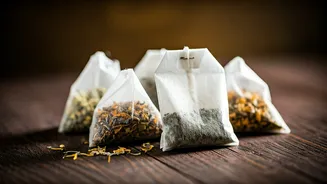Tea Powerhouse: Introduction
Herbal teas have long been celebrated for their health-promoting properties, and their potential to support cardiovascular health is especially noteworthy.
Elevated cholesterol levels are a major risk factor for heart disease, making it crucial to explore natural ways to manage them. Incorporating herbal teas into your daily routine can offer a flavorful and effective approach to lowering cholesterol and improving overall heart health. These teas are packed with antioxidants and other beneficial compounds that work synergistically to protect the heart and improve blood flow. Furthermore, they are a refreshing alternative to sugary drinks, which can negatively impact cardiovascular health. By understanding the specific benefits of each tea, you can tailor your choices to best meet your individual needs and preferences. Let's explore five such teas and how they can improve your health.
Hibiscus' Red Bloom
Hibiscus tea, known for its vibrant red color and tart flavor, is a powerful ally in the fight against high cholesterol. Studies have shown that regular consumption of hibiscus tea can significantly reduce both systolic and diastolic blood pressure, lowering the risk of heart disease. The antioxidants present in hibiscus help to combat oxidative stress and inflammation, key factors in the development of cardiovascular issues. To prepare hibiscus tea, steep the dried calyces of the hibiscus flower in hot water for about 5-10 minutes. The resulting tea can be enjoyed hot or cold. Consider adding a touch of honey or lemon to enhance the taste. It's best to consume the tea regularly to see the best results, as consistent use contributes to sustained health benefits. Remember to consult with a healthcare professional before making significant dietary changes, especially if you're taking medications for blood pressure or cholesterol.
Green Tea's Strength
Green tea, a staple in many cultures, is also a formidable beverage for heart health and cholesterol reduction. It is rich in catechins, a type of antioxidant that helps to lower LDL cholesterol (often referred to as “bad” cholesterol) and improve overall cholesterol profiles. These catechins work to prevent the oxidation of LDL cholesterol, which can contribute to the formation of plaque in arteries. Furthermore, green tea can improve blood vessel function and reduce the risk of blood clots. Brew green tea using water heated to just below boiling point (around 170-180°F or 77-82°C) to avoid bitterness. Steep the tea leaves for 2-3 minutes. This method ensures you get the most out of the beneficial compounds. Regular consumption of green tea, possibly several cups per day, can provide substantial benefits. Remember, green tea contains caffeine, so be mindful of your intake if you are sensitive to stimulants or have other health conditions.
Oolong's Cholesterol Combat
Oolong tea, a partially oxidized tea, offers a unique blend of benefits for heart health. Like green tea, oolong is rich in antioxidants that help to reduce LDL cholesterol levels. Research suggests that oolong tea can improve the body's lipid metabolism, helping to maintain healthy cholesterol levels. This tea can also improve blood flow and reduce the risk of arterial plaque buildup. The oxidation process that oolong tea undergoes provides a distinct flavor profile and contributes to its diverse health benefits. Preparing oolong tea typically involves steeping the leaves in hot water (around 190°F or 88°C) for a few minutes. The steeping time can be adjusted to suit your taste preference. Several cups of oolong tea can be enjoyed daily, but always start gradually to assess how your body responds. Oolong tea, with its unique taste, is a good alternative to green tea.
Hawthorn Berry's Aid
Hawthorn berry tea has a strong historical connection to heart health, acting as a supportive ally. It is known for its ability to improve blood circulation and strengthen the heart muscle. Hawthorn berry contains compounds that can dilate blood vessels, which in turn improves blood flow. In addition, Hawthorn berry tea can help regulate blood pressure and reduce cholesterol levels. It is frequently utilized in traditional medicine for cardiovascular health. Preparing hawthorn berry tea involves steeping dried berries in hot water. The recommended steeping time is around 10-15 minutes, allowing ample time for the active components to be released. This tea is often safe for regular consumption, but it's essential to consult with a healthcare professional, especially if you are taking medications for heart conditions or other health issues. This herbal tea should be taken along with necessary medication to gain maximum benefit.
Conclusion: A Healthy Brew
Incorporating these five herbal teas – hibiscus, green tea, oolong tea, and hawthorn berry – into your daily diet is an effective and enjoyable way to support heart health and lower cholesterol. Each tea offers unique benefits and flavor profiles, allowing you to choose the ones that best suit your taste preferences and health goals. Remember that while these teas can be very beneficial, they should not replace medical advice or treatments. Consult with your healthcare provider before making significant dietary changes, especially if you have pre-existing health conditions or are taking medications. By making informed choices and enjoying these delicious teas, you can take a proactive step toward a healthier heart and a better life. So, sip your way to a healthier heart, one cup at a time!














